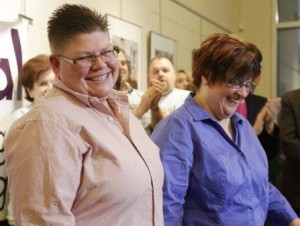Today’s same-sex marriage decision extends a number of benefits to gay couples under Michigan no-fault law.

Michigan same-sex marriage plaintiffs April DeBoer and Jayne Rowse (Photo Credit: Detroit Free Press)
As you have probably heard, the United States Supreme Court issued its landmark decision of Obergefell v Hodges this morning, holding that the U.S. Constitution guarantees same-sex couples the right to marry. Obviously, this decision has enormous implications for our country, as well as Michigan and its communities. In addition, the decision will have ripple effects through many areas of law.
Few people realize, however, that today’s decision, which effectively overturned Michigan’s same-sex marriage ban, has some important effects on auto no-fault law. Specifically, the effects will be felt in Michigan’s no-fault system, as well as liability claims against negligent drivers who cause personal injuries.
Perhaps the most significant effect from the decision will be that same-sex couples can seek no-fault benefits in the event that one of them is injured in an automobile accident. Under the no-fault law, the general rule is that a Michigan citizen injured in an automobile accident draws their no-fault PIP benefits from their own auto insurer, or the insurer of their “spouse [or] relative domiciled in the same household.” Before the US Supreme Court’s decision, one same-sex partner could not draw benefits from the auto no-fault insurer of the other same-sex partner because, under existing Michigan law, those same-sex partners could not be spouses or otherwise legally related. This meant that same-sex couples were treated differently than married couples when it came to what insurance company was responsible for payment of their no-fault benefits. Now, same-sex couples will now be allowed to marry and will, therefore, be “spouses” and able to draw no-fault benefits from one another’s auto insurer.
The second area of Michigan’s no-fault law that is affected by today’s decision is the survivor’s loss benefit. These are benefits that are paid to the dependents of someone who tragically passes away as a result of an automobile accident. Under Michigan’s no-fault system, “spouses” of the deceased are conclusively determined to be a dependent of the deceased, without needing to show any other facts that they were dependent. Due to the gay marriage ban, same-sex couples in Michigan were not “spouses,” so they were required to show in each particular case that they were a dependent of the deceased. This will no longer be required. Instead, same-sex couples who suffer the tragedy of losing their spouse will be able to claim survivor’s loss benefits more easily because they will be presumed to be a dependent of their spouse, just like heterosexual couples.
The Supreme Court’s decision to legalize same-sex marriage will also affect the nature of liability claims arising out of Michigan auto accidents. Liability claims are those brought by an injured person against a negligent driver who causes personal injuries. One type of claim that has long existed in personal injury cases is what is called “loss of consortium.” These are claims that can be brought only by spouses of an injured person, and seek to recover damages for the change in the marital relationship that resulted from the personal injuries. Since the Michigan gay marriage ban has been invalidated, the right to bring loss of consortium claims now extends to same-sex couples. Since the decision allows same-sex couples to be afforded the same rights of marriage as heterosexual couples, same-sex couples will now be able to bring loss of consortium claims in personal injury cases.
These are just some of the changes to Michigan auto no-fault law that will come about as a result of the Obergefell decision. But suffice to say that the recent decision affords same-sex couples more rights under our no-fault system than they had before.
